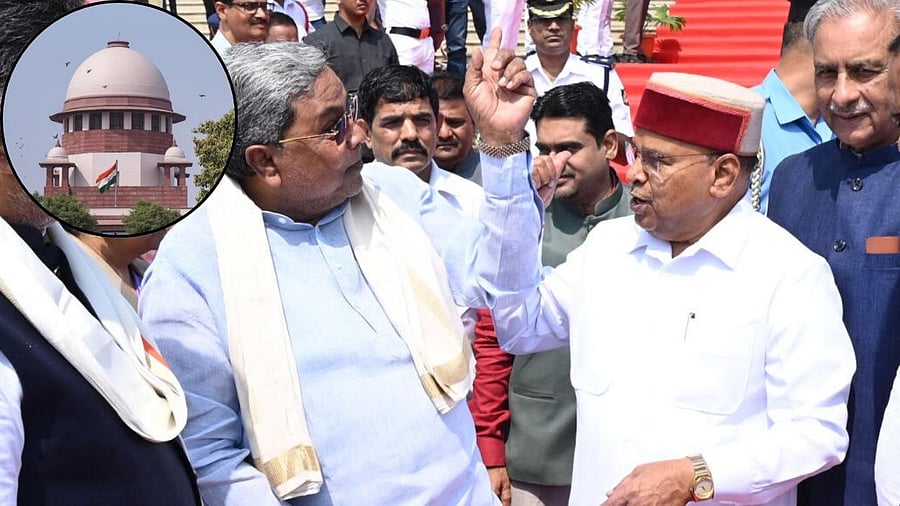
Governor Thaawarchand Gehlot with Chief Minister Siddaramaiah
Credit: DH File Photo
Bengaluru: At least 10 Bills passed by the Karnataka Assembly are awaiting Presidential assent, which includes enactments making Kannada the medium of instruction in primary education and introducing reservation for Muslims in contracts.
The Supreme Court’s view Thursday that no timeline can be fixed for Governors and the President to give their assent could become a setback for Karnataka where the state government is keen to enact the Bills.
“The Supreme Court judgement allowing the President and Governors to hold on to Bills without a defined time limit is deeply unfortunate and raises serious democratic concerns,” Congress MLC Ramesh Babu said.
“Such an interpretation effectively creates a veto by delay, enabling unelected Constitutional authorities to stall the functioning of duly-elected governments,” Babu said.
Karnataka’s Bill amending the Right of Children to Free and Compulsory Education Act is pending Presidential assent since May 2015. Introduced by the first Siddaramaiah-led Congress government, the Bill sought to make the mother tongue or Kannada as the medium of instruction for Classes 1-5. This was done after the Supreme Court, in a landmark 2014 order, rejected Karnataka’s case and said that the government cannot “impose the mother tongue” in primary education.
The Karnataka Hindu Religious Institutions and Charitable Endowments (Amendment) Bill, which seeks to ‘tax’ rich temples, is also awaiting Presidential clearance.
According to the Bill, 10% of the gross income of temples whose gross annual income exceeds Rs 1 crore will be put in a common pool. Also, 5% of the gross income at institutions whose gross annual income exceeds Rs 10 lakh, but is less than Rs 1 crore, will be used for the pool. The Opposition BJP had opposed the passage of the Bill.
Also pending before the President is the Karnataka Transparency in Public Procurements (Amendment) Bill. It provides Muslims with a 4% reservation in public contracts valued up to Rs 1 crore.
Presidential assent is awaited for the Karnataka (Mineral Rights and Mineral Bearing Land) Tax Bill, which allows the government to levy taxes with retrospective effect on mineral rights and owners of mineral-bearing lands. This is estimated to fetch the government Rs 4,713 crore.
“India’s federal structure works only when Constitutional posts operate within clearly defined limits. Ambiguity in timelines disrupts governance, delays public welfare measures, and erodes public trust,” Babu said.
